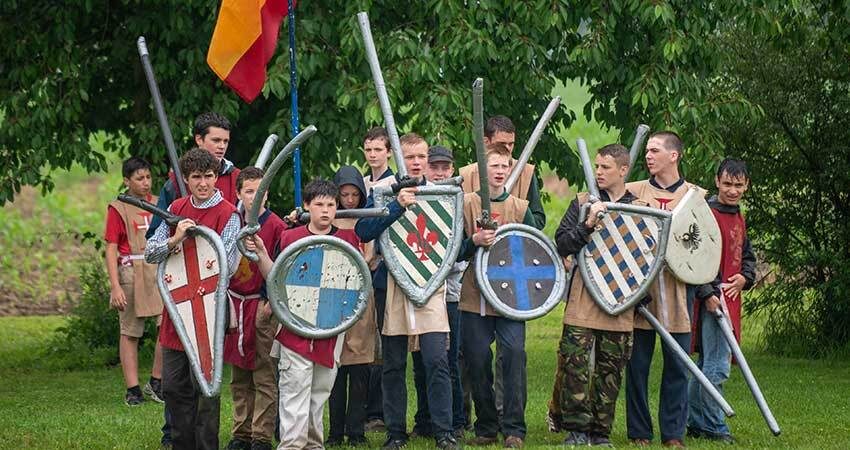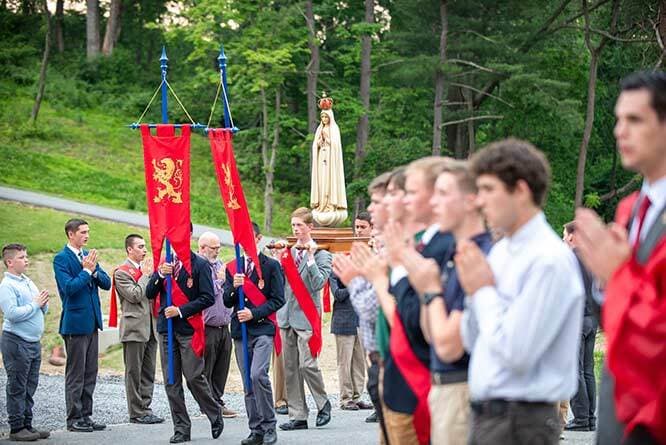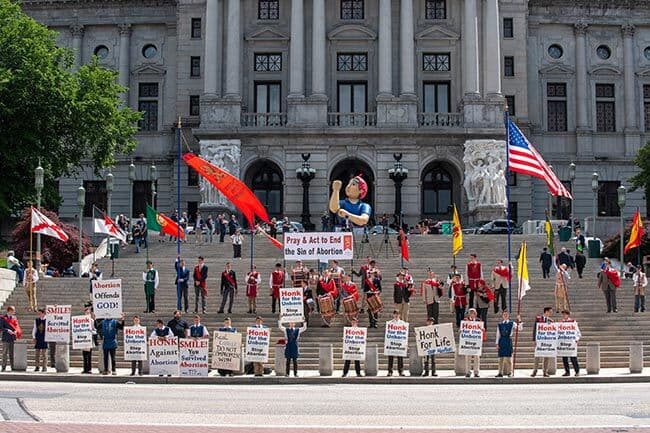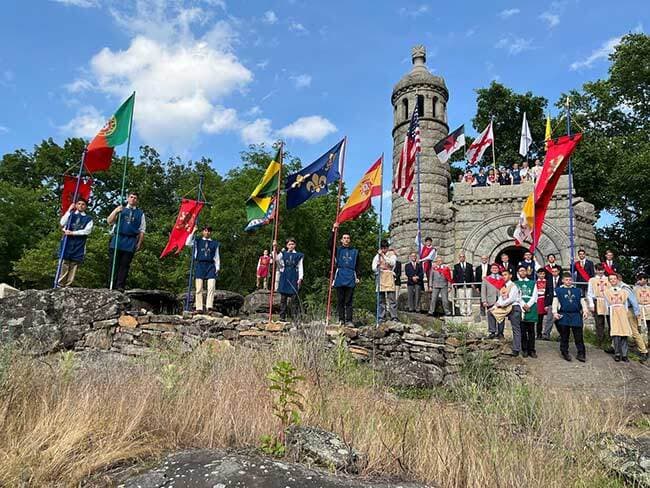
Chivalry, Courage, and the Cross: A Catholic Camp Like No Other
In a world that mocks virtue and where manhood is under siege, the 2025 Call to Chivalry Camp stood out as a shining example of what young Catholic boys can and should aspire to: a life of honor, sacrifice, and service for the greater glory of God.
Held once again at the Saint Louis de Montfort Academy in central Pennsylvania, this year’s camp brought together young men from across the country for ten days of adventure, formation, and Catholic camaraderie unlike anything the world has to offer.
From talks on saints and history to swordplay, skits, and silent prayer vigils, the camp wove the ideals of chivalry into every detail—reminding us that heroic virtue is not a thing of the past.
(Get information about the next TFP camp here)
Packed with Activities
The tone was set on the very first morning when the sound of bagpipes filled the halls to rouse the campers from their beds. After lining up for prayer and inspection, the boys launched into a day packed with activities.
A morning Rosary at the Lourdes Grotto, complete with Gregorian chant and the raising of the TFP standard, helped anchor the day in devotion to Our Lady. Then came breakfast, talks, field games, skits, and tournaments.

Catholic Heroes of Portugal
The camp theme this year focused on the Catholic history and heroes of Portugal, with special emphasis on the apparitions of Our Lady of Fatima. Talks throughout the week highlighted towering figures such as Dom Afonso Henriques I, Saint Nuno Álvares Pereira, and Prince Henry the Navigator—men who combined Faith and action to shape a civilization deeply rooted in the Catholic Church.
The boys also explored the saga of Portuguese sea captains such as Afonso de Albuquerque, bringing to life the courage and missionary zeal that helped spread the Faith across continents.
Formation and Games
Campers didn’t just sit and listen—they acted, trained, and lived the ideals they learned. Daily field games, tomahawk throwing, swordplay, archery, and indoor tournaments kept spirits high.
One highlight was the legendary “Prison Break” game, where “captured” campers had to outwit and outrun guards equipped with flashlights. The game combined strategy, stealth, and teamwork—ending with root beer floats and, finally, the chanting of the Salve Regina.
Other events included charades, a complex treasure hunt, surprise room inspections, and skits based on real historical episodes. A theatrical reenactment of Saint Nuno’s bold defiance against the treacherous Count Andeiro involved a real banquet table being overturned—china and goblets crashing down in a moment that left a lasting impression on the boys.
Response to the Culture War
The camp didn’t shy away from addressing the crises facing our world today. Talks like “The Three Revolutions” (Protestant, French, Communist) and “The Revolution of the ’60s” revealed how pride, rebellion, and impurity have repeatedly attacked the moral order. But the message wasn’t despair—it was spiritual courage to restore the values of Christian Civilization.
Campers heard about TFP Student Action’s pro-life campaigns and campus outreach, and many were visibly inspired. They also learned how to make a good Confession, and participate in the Five First Saturdays Devotion.
The boys enjoyed attending a public pro-life Rosary rally at the Pennsylvania State Capitol, boldly standing up for the unborn. They visited Gettysburg, the Museum, and Cyclorama painting and marched on the battlefield to the sound of bagpipes. Astonished onlookers witnessing the scene applauded the boy’s presence with warm enthusiasm.

Vigil of Arms
One of the camp’s most sacred traditions is the Vigil of Arms, a candlelit night of prayer held in front of a relic of the True Cross. Each boy kept vigil for one hour, imitating Saint Francisco Marto, who offered sacrifices and prayers of reparation to console Our Lord for the grave sins of mankind.
The silence, the flickering candles, the sacrifice of waking at night—all this was a fitting ceremony of reparation to atone for the sins committed in June as “pride” is paraded and celebrated. This vigil offered reparation to the wounded Sacred Heart of Jesus and the Immaculate Heart of Mary.
Portuguese Culture in the New World
A highlight of the camp was a taste of Portuguese culture in the new world: traditional Brazilian feijoada with farofa, pão de queijo, collard greens, and more. The authentic dish, prepared by TFP volunteers, offered the boys a literal taste of the rich Catholic heritage they were studying.
Saint Joseph of Anchieta
Mr. Byron Whitcraft gave a talk about the conversion of Brazil (now the largest Catholic nation in the world). His talk focused on Saint Joseph of Anchieta (1534-1597), the Apostle of Brazil. The Jesuit saint worked numerous miracles, including pacifying and subduing a wild jaguar that terrorized a village.
Saint Anchieta is considered the father of Brazilian literature, the founder of the first classic school in the Americas, and the author of the first compilation of an indigenous language. He spent his life entirely for God, taking little rest or sleep and laboring constantly for the conversion of the savage Indians.
Beautiful Miracle
When Fr. Anchieta was held hostage by the Tamoyo tribe, he was assailed by temptation due to the immoral behavior of the Indians. To overcome temptations against purity, he composed a poem in honor of the Immaculate Conception of the Blessed Virgin Mary.
Without pen or paper, he wrote his verses on the sandy beach with a stick. Although the waves washed over his poetry, Saint Anchieta was surprised to find that his writing remained miraculously intact and legible even after the waves washed over them. It was as if Our Lady was answering his prayer to stay pure in such a licentious setting.
He memorized the verses in Latin. And when he was freed, he committed all 4,172 lines of the poem to paper.
Medieval Games and Banquet
The final day saw the long-anticipated Medieval Games and Banquet—complete with banners, panoply, music, and awards.
As the boys and their fathers packed up to leave, one thing was certain: they were not the same. They came to the Call to Chivalry Camp looking for a bit of adventure—but they left better men.
They now return home better prepared to fight for virtue, defend the Church, and live out the maxims of Catholic chivalry in a dark world that desperately needs the light of Christ.
May Our Lady of Fatima bless all the participants of the 2025 Call to Chivalry Camp, and may She raise a new generation of saints, soldiers, and heroes to restore Christian Civilization for the glory of Her Divine Son.
(Get more information about the next TFP camp here)

What Parents Say About the Camp:
“Amazingly improved table manners…”
Hugh Thomas and Patrick had a wonderful time! We have always recommended the camp to other families and will continue to do so!
The camp has a very positive effect on the young men -- to be able to meet the other boys and the men of the TFP and share and participate in the amazing lessons and conversations of the Catholic Faith is just priceless.
What I did notice instantly when they arrived home at dinner time was amazingly improved table manners! Positive peer pressure at its finest!
God bless you all!
Patrice and Mike J. and family
“We most heartily recommend this camp…”
TFP camp experience is like no other. It is a beacon of hope in this modern, secular world, shaping boys to be chivalrous, brave, and devoted to Our Lady. Our son simply loved the camp the last two years he has gone. We noticed a measured improvement in his teamwork skills and chivalry, but most importantly in his focus on his devotion and prayer life. He said his favorite part of camp was the talks and the campaign; he learned so much. We most heartily recommend this camp to help raise boys to stand tall against secularism and modernity.
We will continue to pray for your work and success! Thank you again!
In Christ,
Norah B.
“Exceeded my expectations…”
Thank you so much for putting on this camp! I was very impressed by the level of organization and professionalism with which the camp was conducted by every volunteer with whom I came into contact. The discipline, manners, and etiquette that were expected of our boys exceeded my expectations. The camp experience galvanized our boys' relationship with each other, which is priceless! We intend on keeping up the practice of praying three (3) rosaries (a full rosary) everyday, which our boys did at the camp.
I fully intend on recommending this camp to other families at our parish.
God bless you all!
Phil B.
“Our Lady is the center and focus…”
I would like to take a moment to thank you and all the TFP members for the wonderful influence you have on my son and for your many efforts and hard work to encourage these young boys to strive for sainthood through discipline, order and virtue.
I know that for many boys, the Call to Chivalry Camp was a wonderful and exciting time of growth in virtue and maturity. But for my son, it was something even more; it was even a Divine Intervention in his life. He not only grew more in virtue but he was drawn to our Blessed Mother through this Camp and had an example of manhood in his life…. He matured immensely after every camp, and he even told me that he is ready to leave childhood behind and become a man!
What makes this camp so special and different from other camps is the fact that Our Lady is the center and focus! I have always tried to encourage my children to love our Blessed Mother more than they love me, their earthly mother. Seeing that my son was encouraged to love Her throughout the entire Camp, and to honor Her is what gave me the readiness to let my son go to the Academy. He is being formed into the saint that God wants him to be, and I cannot thank all of you enough for playing such a big role in his journey to Heaven!
In Corde Iesu,
Beáta L.

